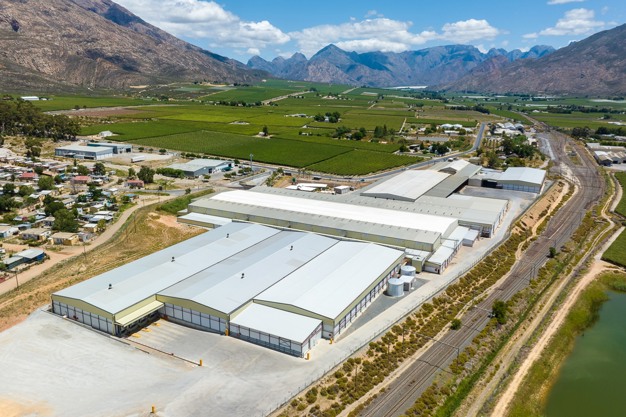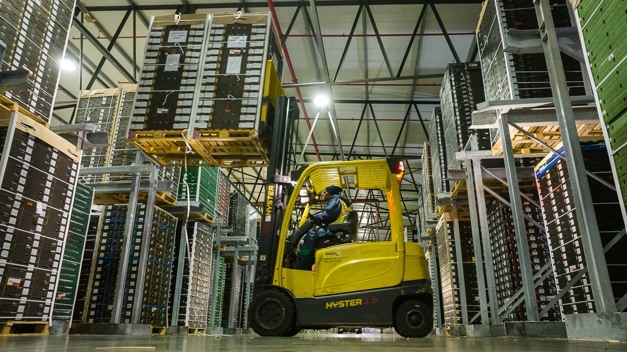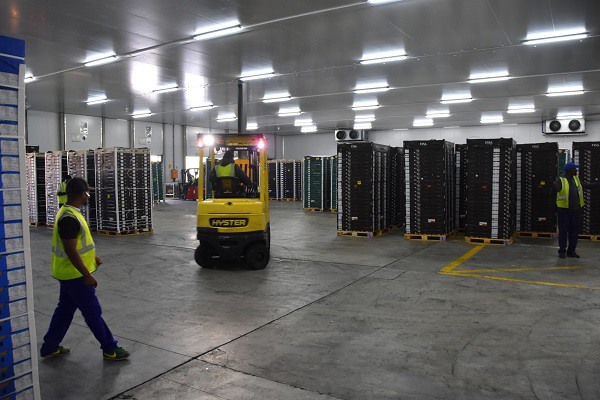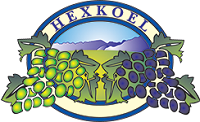Hexkoel, the cold store for a good quarter of South Africa’s grapes, describes itself as a co-op still, the way they started forty years ago. Today the Western Cape facility has become indispensable, cooling and storing three-quarters of the grapes coming from 250 packhouses in the Hex and surrounds.

Hexkoel
Not only grapes, but since Covid Hexkoel has taken in pallets of, mostly, soft citrus from the Breede River and rest of South Africa.
“The problem is there are not enough pack sheds and cooling spaces. There’s a big wave of citrus coming. We took in 5,000 pallets in the first year and last winter we stored 32,000 pallets,” says Hexkoel CEO Stephan Antonowitz.
Essential to their functioning is a deep well of electricity, equivalent to what's needed to power about 4,000 kettles during peak demand at night when most pallets arrive.
“Back in the 1980s it was easy,” remarks Anton Viljoen who is the chair of the Hexkoel board and a grape farmer himself; you have to be to sit on the Hexkoel board. “You just had 4.5 kg cartons, you could start loading from any spot in the cold room for conventional ships. Then the container system came in and brought with it a big requirement for storage and stock that stands for longer.”
He adds: “To get a container truck into a farm in the Hex River is close to impossible. In the Northern Cape, due to the distance, farms all have their own cooling and pack straight into reefer containers. It’s the better thing for the fruit.”
Grape season becomes a mad dash
The rhythm of the grape season has radically sped up: what used to take them five months, sometimes even into May, is now squeezed into ten or twelve weeks.
New varieties have higher yields, and meanwhile elsewhere in the world grape growers were also planting – now Egypt comes in by week 10 and the export market for South African grapes drops away (apart from some Hex Crimson Seedless stored for UK supermarkets).
Grapes are picked early morning, most arriving palletised by late afternoon or evening. After reaching temperature – it used to be 48 hours later, now it’s 24 hours but they aim for 12 to 16 hours – it is, theoretically, ready to be shipped.
 Hexkoel handles 18 million cartons (4.5kg) of table grapes annually
Hexkoel handles 18 million cartons (4.5kg) of table grapes annually
Viljoen, who brings his own grapes here, continues: “Every year the growers build their packhouses bigger to pack quicker, so the rest down the line need to be bigger and quicker. We’ve had to adapt our cold stores, here and all over South Africa.”
Truck operators had to add more skeletal trucks, shipping lines had to steer more containers South Africa’s way – and the harbours had to adapt to loading more fruit.
Over the last five years Hexkoel spent most of its money on additional storage space. They have more than most, with capacity for over 17,000 pallets stored onsite. “In the good old days pallet dwell time was two days," remarks Antonowitz. "Now it's five or six days."
Logistics just never was an issue for them - until 2020.
“Covid played a big role in storage of fruit due to customers being in lockdown. Meanwhile Cape Town's port became less efficient so we couldn’t load a week’s harvest onto the ships anymore. Those are the two main reasons for the big storage facilities. We can’t keep it in the vineyards.”
He continues: “Now when they bring in the huge container ships, where we need to do a thousand or more containers, somewhere along the line we get windbound, equipment breaks down and the ship stands.”
Meanwhile, empty reefer containers on vessels waiting outside port cannot be offloaded.
Breakbulk comes with issues
Conventional shipping is reclaiming market share, but a vessel taking 4,500 pallets makes barely a dent to the 18 million 4.5kg cartons moving through Hexkoel every year.
“Our biggest issue with conventional ships is the standard pallets. If it were hi-cube pallets we could load out of this cold store from beginning to end. Now we need to pack a special-sized pallet.”
It is not ideal that every grower has their own cartons with ventilation holes in different places and warm spots forming in the tunnels. Uniform packaging should solve it, and they expect more of it in time.
Hexkoel is not a cold treatment facility but the plan is to build cold treatment facility for citrus and grapes to China, the United States and others markets with cold treatment as protocol. They’d been waiting for citrus volumes to make it viable.

Energy
After labour, electricity is their biggest cost. During power cuts their eight diesel generators, at 100 litres an hour, kick in.
A quick fix, but a costly one, Antonowitz remarks.
“Hexkoel is maybe unique in that 10% of our fruit comes during the morning until 2pm, 40% until 6pm, and the other half arriving until 10pm. Tonight at 8pm we’re at peak demand, needing 4,200 KVA of power. Solar therefore goes out the door, unless you add lithium batteries.”
He regards solar energy as part and parcel of the future energy mix, but it doesn't yet answer to their needs. The fancy footwork to keep machines running while electricity comes and goes from different sources is detrimental to electronics.
“What you have here,” Antonowitz points out, “is an R800 million [39.2 million euro] investment. If you look at value of the cargo that annually goes through here, it’s over R3 billion [392.2 million euro]. From a service cost perspective we’re one of the lowest because of economies of scale.”
He adds that they’re producer-driven, not driven by a return on investment.
“At the end of the day, the money is from a little box of grapes, that’s the sad part of it,” Viljoen observes. “Fruit is made to be on a ship as quickly as possible.” For more information:
For more information:
Hexkoel
Tel: +27 23 354 8922
Email: [email protected]
